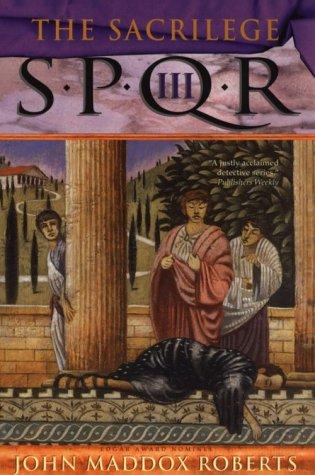The Sacrilege
by John Maddox Roberts

Reviewed by Coral
Okay, so apparently this is book 3 in Roberts' SPQR series, which I did not know when I picked the book up (to be fair, my copy doesn't have the big SPQR with the Roman numeral three on its cover) so I read it without reading the first two novels. Does this story contain spoilers for the first two? I would say nothing overt; no one ever came out and said "Hey, remember when so and so brutally murdered so and so." Are there any subtle spoilers? There may be. If I had to guess, I'd day the bits about Decius' needing to flee Rome a bunch of times to escape assassination and his past relationship with Clodia were probably dealt with in earlier books.
Anyways, as we pick up the story, things are looking better for Decius Caecilius Metellus the Younger. Things have calmed down enough that he feels safe to return to Rome, he's been newly elevated to Senator, and he's been asked to help a kinsman, Celler, run for Consul - an honor indeed.
Of course he's made his share of enemies: Clodius, Celler's brother-in-law, part of the powerful Claudian patrician family, trying to get himself made a plebian so he can run for Tribune, with the power to veto any bill passed by the Senate; Clodia, with whom he shares an intimate past, who, if rumor is to be believed, loves her brother in more than a brotherly way; and Pompey, a general returning in triumph to Rome.
But he's used to his enemies - after all he has had to flee Rome to escape them before - so he just goes about his regular business, delving into the politics of his new position. Unfortunelty trouble has found Decius once more: at a dinner party his host is killed, an all-women religious ceremony is defiled by Clodius, who poses as a woman to gain entrance, and another unsuccessful attempt is made on Decius' life.
Now, as the body count rises, Decius must unravel the mystery, before it costs him his life.
This book is set, historically, in the period just before Crassus, Pompey and Caesar's Triumvirate. Roughly the same period as some of Steven Saylor's early books, which makes the comparisons impossible to avoid. It's not that this book is bad, the mystery was enjoyable, the ending was twisty in a way I haven't yet read in another mystery novel, and there was no character that filled me with hate. It just, somehow, didn't quite measure up to Saylor on the invisible scale I have in my head.
Small minor nitpick: I hate it when authors use the word pederast, because to me it has a very negative connotation. The way the definition stresses "especially with a boy" seems more in line with pedophiles than someone having consensual sexual relations with a member of their own gender. Yeah, my sister has told me for years that I'm way too politically correct about these things, but I just don't like the thought of intolerance no matter how slight or imagined on my part.
Grade: B